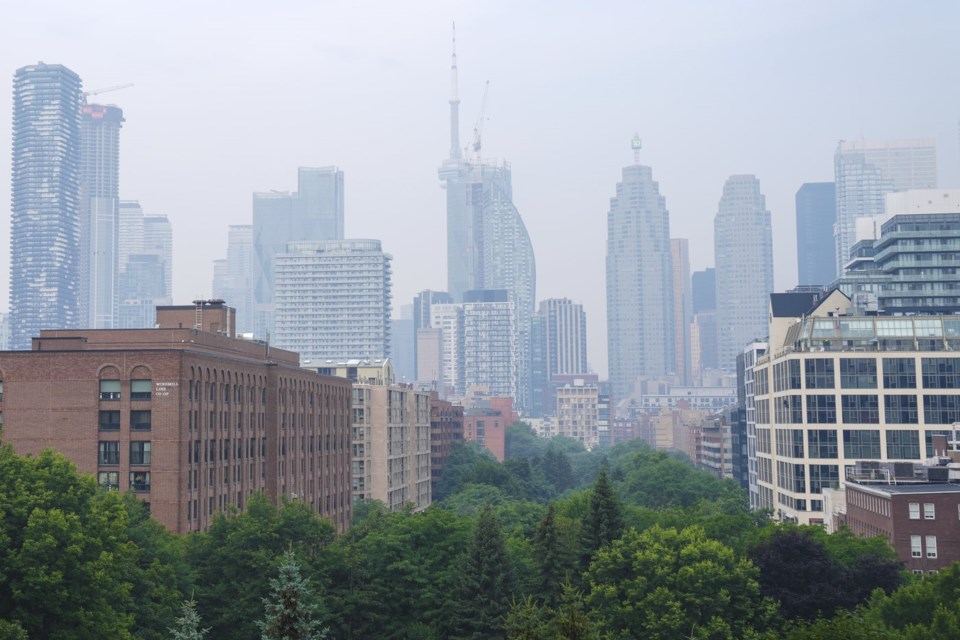TORONTO — Much of Central Canada, Manitoba and Saskatchewan were placed under special air quality statements or warnings on Monday due to smoke from wildfires, as Environment Canada advised residents to limit time outdoors and watch for smoke exposure symptoms.
The weather agency said air quality was poor across swaths of Ontario and Quebec as westerly winds brought in smoke from forest fires in the Prairies and northern Ontario.
Air quality warnings for areas including Toronto were downgraded to special statements later on Monday as conditions somewhat improved. The Air Quality Health Index rating for Toronto was over 10, or "very high risk," on Monday morning, dropping to a "high risk" rating of 8 by late afternoon.
Southern Ontario and Quebec were also placed under heat warnings Monday, with forecasted daytime highs of up to 32 C.
"When there is an extreme heat event occurring with poor air quality, prioritize keeping cool," Environment Canada said.
The weather agency also issued air quality warnings in central Saskatchewan and a special statement for much of Manitoba, noting that air quality and visibility due to wildfire smoke can fluctuate over short distances and vary from hour to hour.
Environment Canada said residents should consider limiting time outside and be mindful of smoke exposure symptoms. Though everyone's health is at risk amid wildfire smoke, those who are 65 or older, pregnant, young children, and have an existing health condition or work outdoors are more likely to be impacted, it said.
"Check in on others who are in your care or live nearby who may be more likely to be impacted by outdoor air pollution," the agency said, adding that people should reschedule or cancel outdoor events, and keep windows and doors closed as much as possible.
For Randy Mitchell and his co-workers at a downtown Toronto construction site, staying out of the smoky air was a challenge on Monday.
Even though the crew working on a new subway line was encouraged to take breaks indoors, Mitchell said someone still had to be on each corner of the site at all times.
"It's very humid, very humid right now," he said. "The breathing quality is just … it's horrendous."
Mitchell said he was trying cope by "drinking water and ducking into buildings if I can."
Cristian Velasquez, a student at Toronto's George Brown College, said he was seeking refuge on campus, where there's air conditioning, and trying to consume lots of cold beverages.
He said the poor air quality didn't affect his breathing, but he still planned to stay out of the hot and humid conditions.
"I was thinking of generally staying home for, like, most of the week," he said, especially since many of his classes have been cancelled for unrelated reasons.
Dr. Howard Shapiro, Toronto's associate medical officer of health, said immediate effects caused by smoke irritation can include a runny nose, itchy throat and red or burning eyes.
The second type of symptoms is caused by inflammation that happens when someone's body is reacting to an irritant, Shapiro said in an interview. That often includes a cough, difficulty breathing and shortness of breath.
Environment Canada recommends people wear a well-fitting respirator-type mask, such as an N95 mask, if they have to go outside, but Shapiro cautioned against relying on a mask for full protection from the harmful particles in the air.
“There's other things in the air from wildfires, smoke, and (masks) don't really offer much in the way of protection from (those) different chemicals," he said. "But I think their impacts on health are less well characterized because they're much more difficult to measure.”
He recommended people stay indoors and avoid strenuous activity, adding that the city has six "cleaner air spaces" – including city hall – where people can go to find some relief.
But some took the air quality warnings in stride and made the most of the day under Toronto's hazy skies.
Jody Chiungyi, who is visiting Toronto from Taiwan for a week, spent three hours at the downtown Nathan Phillips Square creating a painting of the famous Toronto sign and city hall's curved buildings.
“I feel good and ordinary” Chiungyi said.
This report by The Canadian Press was first published July 14, 2025.
Rianna Lim and Vanessa Tiberio, The Canadian Press


